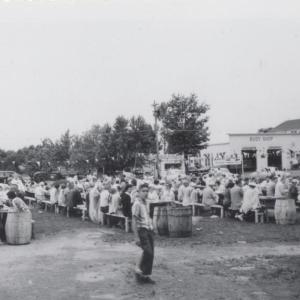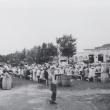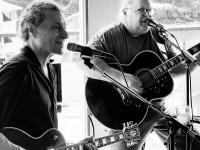Bob Goodspeed’s Memories, Part II
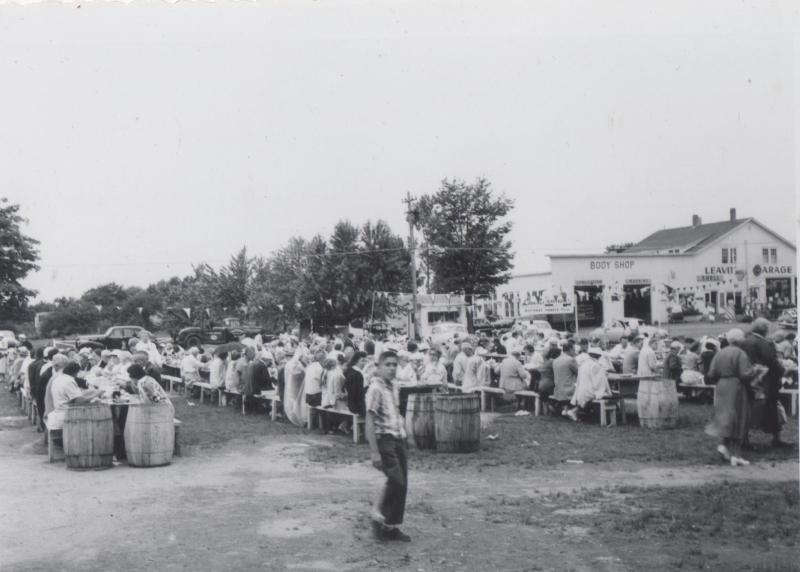 A July 1954 view looking west across Boothbay Center’s Common to Leavitt’s Garage, where Bob Goodspeed worked in the early 1950s. The occasion is Lobster Time, a Boothbay Center PTA fundraiser for the soon-to-be region high school’s library/study hall. During the event and festival, 615 people were served. Courtesy of the Boothbay Region Historical Society
A July 1954 view looking west across Boothbay Center’s Common to Leavitt’s Garage, where Bob Goodspeed worked in the early 1950s. The occasion is Lobster Time, a Boothbay Center PTA fundraiser for the soon-to-be region high school’s library/study hall. During the event and festival, 615 people were served. Courtesy of the Boothbay Region Historical Society
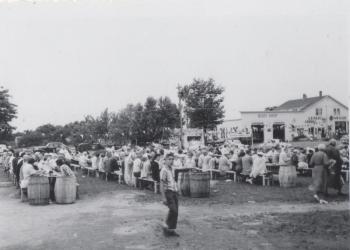 A July 1954 view looking west across Boothbay Center’s Common to Leavitt’s Garage, where Bob Goodspeed worked in the early 1950s. The occasion is Lobster Time, a Boothbay Center PTA fundraiser for the soon-to-be region high school’s library/study hall. During the event and festival, 615 people were served. Courtesy of the Boothbay Region Historical Society
A July 1954 view looking west across Boothbay Center’s Common to Leavitt’s Garage, where Bob Goodspeed worked in the early 1950s. The occasion is Lobster Time, a Boothbay Center PTA fundraiser for the soon-to-be region high school’s library/study hall. During the event and festival, 615 people were served. Courtesy of the Boothbay Region Historical Society
This is a continuation of Bob Goodspeed’s memories, many which he told me about in 2012. Also Nora Brewer taped Bob in 2016, gathering more details. The first article covered local jobs during his high school years and his time in the Navy. Bob’s varied work life was typical of most local men; he is now 90. Barbara Rumsey
National Guard
I was discharged out of the Navy in March 1948. On October 2, 1948 I married my high school sweetheart, Blanche Hodgdon, and we settled down in Boothbay. There wasn’t much for work around here after the war, so I had gone and joined the National Guard in Bath, Battery B, the Triple A gun battalion. I was going up there every month, drilling and whatever at the Bath Armory. And the next thing we knew, the Korean War had started and we were federalized. We became the National Guard of the United States. And they sent us down to Camp Stuart in Georgia to train. We was there almost a year, and two or three times they’d tell us to pack up, you’re going to the West Coast, but then they would rescind the order and we didn’t do that. I got a picture of me down there. We were in squad [nine men] tents with the snow up to my knees.
Anyway, they sent us up to Fort Hancock in New Jersey, out on the very end of Sandy Hook, and we were there another year or year and a half at Hancock. We didn’t know why we were there because, what were we protecting? The government at times don’t know what they’re doing with you—when there’s no war going, they don’t know how to keep you busy.
Dragon Lady
After I got discharged in 1952, I worked at Leavitt’s Garage at the Center [the site of the town office] repairing vehicles. One day Emery Howard from the Harbor came in with a car to be repaired and asked who he could get as engineer for a yacht he captained. The opening was on an 80-foot ketch called the Dragon Lady, docked in Marion, Massachusetts. She had a captain, a mate, an engineer, a steward/cook, and she slept 16. I decided to apply and got the job. Awful nice people to work for. They’d take you to Boston and suit you up in all your clothes for yachting. Everyone had a uniform for yachting back in those days. I was the engineer and light sailor. When they were sailing and not using the engine, I tended the jib and spinnaker and whatever they wanted to use. The mate, who tended the mainsail and after sail, and the steward/cook came from Nova Scotia
She was a centerboard vessel. With the board down and a good southwest wind, she would go, I’m telling you, put the lee rail right under. The owner, William Parker, loved it and his wife hated it. When she came aboard she’d come with all these knickknacks because we were going to be gone all summer — we’d end up in Canada before we’d come back. When we were heeled over the knickknacks would fall down and break.
We came in here once. The owner came to me and said, “Bob, this is your home town. Go ashore and get your wife and your baby (which would be Marsha). Bring ‘em out and have ice cream.” So I went ashore in the power tender and got on the phone and I don’t know who brought her down ‘cause she didn’t know how to drive. So we went out and had ice cream and the owner says, “Why don’t we go for a sail and show her how she sails.” We left the harbor and went up the Sheepscot to Oven’s Mouth with that big boat, turned around and came back. After I thanked him, he said, “Well, you gotta a nice family. I just thought they’d enjoy it.”
Conditions Onboard
He was an awful nice guy, he really was. If there was salt on windows or portholes he’d go get a bucket of fresh water and a sponge and a chamois and he’d clean it off. “Oh, nope, Bob. I’ve got it, I’ve got it.” That’s the way he was. We got paid every two weeks. Back then, right after World War II, I got $85 a week. Not only that, I had all clothes right down to the underwear! Neckties, handkerchiefs, stockings, sneakers, cold weather gear all furnished by the boat. And if you smoked cigarettes, a carton a week paid by the boat; if you drank beer, case of beer a week paid by the boat; and all your laundry was done paid by the boat. I sent $75 home and I might keep $10 for myself. I didn’t need it for anything else.
We ate what the owner ate. Only thing — he loved fish for breakfast, but I couldn’t stand it. So when the steward was cooking meals, he would look at me and say, “You gonna have fish, Bob?” I would say, “No. You know better than that.” He’d make me bacon and eggs, some home fries or something on the side. We’d go fishing in the morning and just drift in the Sound on that 80-foot vessel so he could catch fish for breakfast.
Well, anyway, I was with them three years. His wife finally convinced him to sell the boat and have a power boat and go flat. We were all done — he gave us all bonuses — I got $500 for three years of being with him. He had her built brand new, steel, painted black, two decks. He really didn’t want to let go of that boat; he loved it.
Event Date
Address
United States

